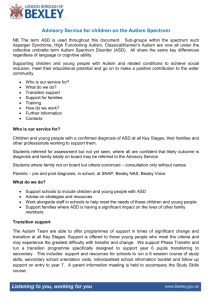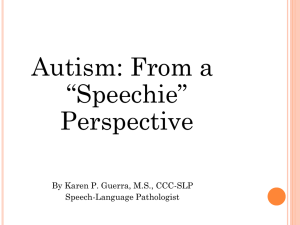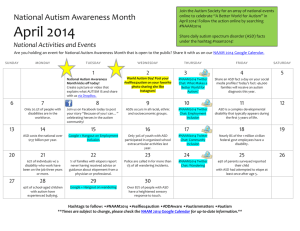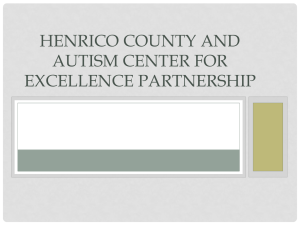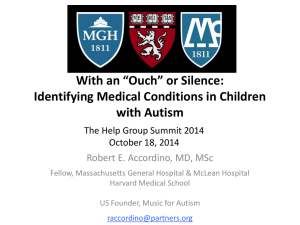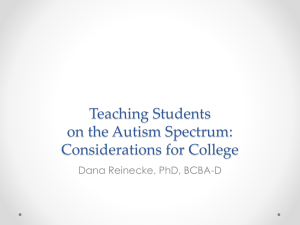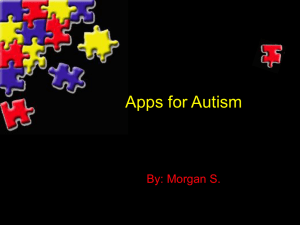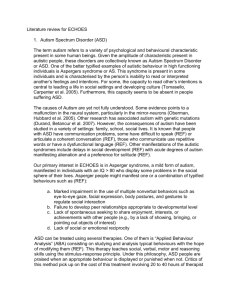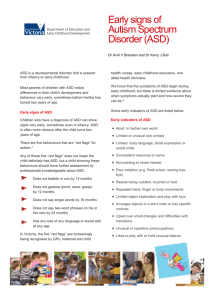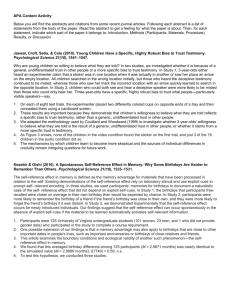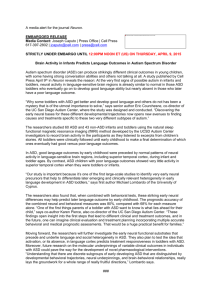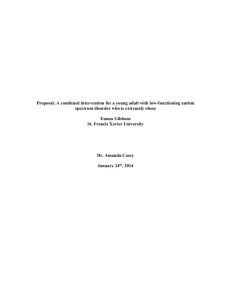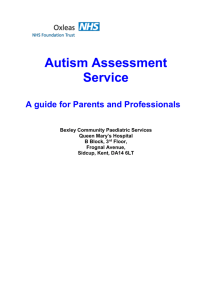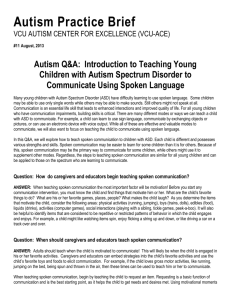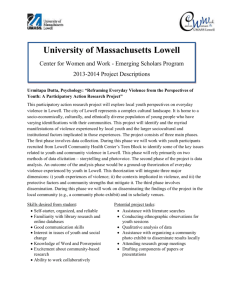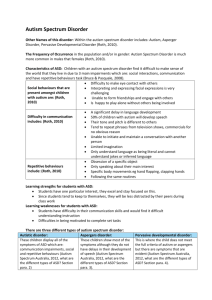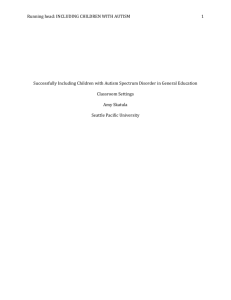Database of Children with Autism Spectrum Disorder Living in the
advertisement
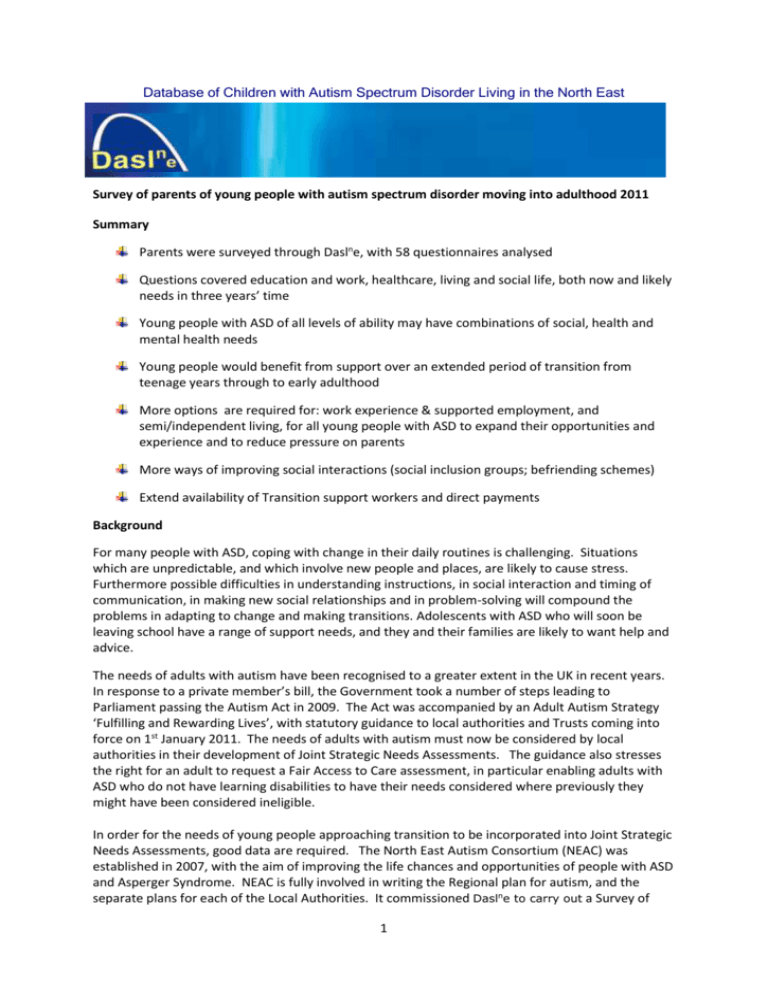
Database of Children with Autism Spectrum Disorder Living in the North East Survey of parents of young people with autism spectrum disorder moving into adulthood 2011 Summary Parents were surveyed through Daslne, with 58 questionnaires analysed Questions covered education and work, healthcare, living and social life, both now and likely needs in three years’ time Young people with ASD of all levels of ability may have combinations of social, health and mental health needs Young people would benefit from support over an extended period of transition from teenage years through to early adulthood More options are required for: work experience & supported employment, and semi/independent living, for all young people with ASD to expand their opportunities and experience and to reduce pressure on parents More ways of improving social interactions (social inclusion groups; befriending schemes) Extend availability of Transition support workers and direct payments Background For many people with ASD, coping with change in their daily routines is challenging. Situations which are unpredictable, and which involve new people and places, are likely to cause stress. Furthermore possible difficulties in understanding instructions, in social interaction and timing of communication, in making new social relationships and in problem-solving will compound the problems in adapting to change and making transitions. Adolescents with ASD who will soon be leaving school have a range of support needs, and they and their families are likely to want help and advice. The needs of adults with autism have been recognised to a greater extent in the UK in recent years. In response to a private member’s bill, the Government took a number of steps leading to Parliament passing the Autism Act in 2009. The Act was accompanied by an Adult Autism Strategy ‘Fulfilling and Rewarding Lives’, with statutory guidance to local authorities and Trusts coming into force on 1st January 2011. The needs of adults with autism must now be considered by local authorities in their development of Joint Strategic Needs Assessments. The guidance also stresses the right for an adult to request a Fair Access to Care assessment, in particular enabling adults with ASD who do not have learning disabilities to have their needs considered where previously they might have been considered ineligible. In order for the needs of young people approaching transition to be incorporated into Joint Strategic Needs Assessments, good data are required. The North East Autism Consortium (NEAC) was established in 2007, with the aim of improving the life chances and opportunities of people with ASD and Asperger Syndrome. NEAC is fully involved in writing the Regional plan for autism, and the separate plans for each of the Local Authorities. It commissioned Daslne to carry out a Survey of 1 parents of young people with autism spectrum disorder moving into adulthood, so that the consultation could contribute toward the North East plans. The survey was carried out in April/May 2011. What we did Daslne posted out surveys to all 184 families with a young person aged 16+ on the Daslne database. The surveys focused on the likely needs of young people over the next three years in relation to: support at college (or work), mental health services, personalised support for social/leisure access, accommodation (including short breaks), and so on. 60 questionnaires were completed by parents/carers. What we found Education: Most of the young people are still in full time education and just over three quarters of the responses stated that the young person has had help from Connexions or a school careers adviser or a Transition employment support officer or similar professional. It was promising that most people reported that the advisor had some awareness of ASD. Work: Two thirds of the young people had taken part in work experience, with a wide variety of placements including office work, kitchen work, gardening, working with animals, and so on. Of those who had not had work experience, most attend specialist school/college. Future wishes for work were varied including catering, cleaning, factory work, working with cars, nursing, modelling, and youth worker. The kinds of help and support parents suggested would be needed included clear instructions and a timetable to follow, sympathetic supervisory staff, a calm environment and support with time-keeping. Healthcare: Very few young people (3) make GP or Practice Nurse appointments on their own, with a further 5 reported as being able to do this if reminded and helped. Only 5 young people attended appointments on their own, although some of the help needed by the other young people only related to transport. Others require help with understanding, explaining themselves and/or someone to accompany them due to a dislike of meeting strangers. 70% of the parents reported that their young person would need special help if they had to attend hospital; this was mainly with communication and anxiety reduction. Parents suggested that ward staff would need an understanding of autism, especially sensory issues for young people. Forty percent (23) of the young people currently attend appointments with a mental health or learning disability specialist. At least four had just been discharged from child services without transfer to any adult service. Half of the parents did not know whether the young person would need mental health or learning disability specialist support in three years’ time, but 12 (21%) thought they definitely would. Travel: One third of parents reported that their young person had some independence in travel (‘sometimes travels by bus/metro/train on their own’). The detailed comments show that even those who have some independent travel require some support and that things can go wrong if there is an 2 unexpected delay or diversion. More than half (55%) reported that the young person is always taken to places; however, in terms of expectations in three years’ time, this proportion drops to 40%. Seven comments mentioned training to travel independently, either as organised by college or by the family. Therefore this is an area in which there are likely to be significant ‘hidden’ needs for continuing support and planning. Social life: We asked whether the young person goes out to spend time with friends, and also whether the young person goes out independently on his/her own (by choice). Around half (30) go out to spend time with friends, but half of those require support in order to do so. Fourteen young people (25%) do go out to places on their own, but the comments make clear that this still usually requires support, or is very infrequent. Two explicitly mentioned a personal assistant/care worker, and others have a befriender or go out with a brother or sister. Only 11 (20%) thought that in three years’ time their young person would be independent in having a social life. Several mentioned the need for a carer (through Direct Payments). Living situation: In three years’ time, parents reported that for 33 (57%) of the young people living at home would be the best situation. Only 10 (17%) thought the young person might be living independently (e.g. at university or in shared accommodation); nevertheless it was usually expected there would be a continuing need for some kinds of support. Organisation of support: We asked parents what, in three years’ time, would be the best way to arrange any extra support that their young person needs. More than half (28) wanted a personalised budget (Direct Payments) to pay for assistants, and only 10 (18%) thought no extra support would be needed, while 3 were not sure. One third (19) of the young people have an allocated Transition Support Worker, and almost all of these young people are currently in specialist education (2 in mainstream education). At least 5 parents had not heard of this kind of support worker. In comments, parents appreciated having help with making a transition plan, completion of adult care forms, help to set up an independent budget, and liaison with the adult team. Conclusions In each of the key areas we asked about, parents identified ways in which many of the young people would need support or training – such as using transport, creating a varied social life, living independently of parents, etc. Awareness of the extent to which young people would need prompting to get organised, or additional explanation of the reasons behind expectations of their behaviour, or reassurance in new situations, may allow services and support to be planned responsively. The constant burden on parents to plan ahead, make arrangements, and ensure young people have a varied life should not be underestimated. Acknowledgements We are grateful to all the parents, carers and young people who took time to answer the survey. We are particularly grateful for support and suggestions from Pam Lawrence of the North East Autism Consortium, and also from Professor Ann Le Couteur. For further information about the survey, contact Professor Helen McConachie, Director of Daslne (helen.mcconachie@ncl.ac.uk). 3



